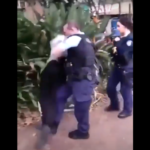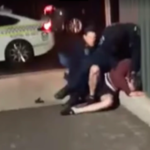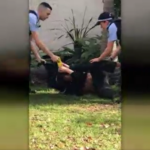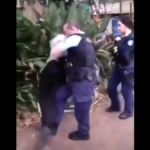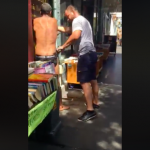NSW Police Officer Found Guilty of Common Assault

It’s difficult to believe that 30 years after the Royal Commission into Aboriginal Deaths in Custody, we’re still hearing about the unacceptable treatment of Indigenous people at the hands of police.
Disturbing Police bodycam and CCTV footage from Goulburn Police Station shows Senior Constable Jeames Murray throwing Indigenous teen Patrick Little’s head into a wall and then his whole body at a cell door.
18-year old Patrick Little was arrested by police in January 2019 for fighting with his cousin. He was then charged with affray, an offence to which he pleaded guilty.
Officer pleads not guilty
Officer Murray was later charged with two counts of common assault, pleaded not guilty and his matter proceeded to a defended hearing.
During the hearing, evidence was presented showing that while Mr Little was initially aggressive and resistant towards Police, he settled down and became co-operative when put into the back of a Police wagon.
Footage shows that at the Police Station, Mr Little emerged from the police van before Senior constable Murray placed him in a headlock and threw him into a door.
The Senior Constable – who is still serving on the New South Wales Police Force – was ultimately found guilty by Magistrate Susan McGowan of two counts of common assault.
He had a criminal conviction recorded against his name and was fined $3500.
Remarks on sentencing
During the sentencing phase of the hearing, Her Honour remarked that Senior Constable Murray, “was the adult and unfortunately he reacted in a way that was not appropriate.
She noted that Mr Little’s behaviour was irritating, but said that “he was only 18 at the time, smaller than the constable”. Her Honour also found that “there’s no circumstance where this was warranted”.
“I do recognise the difficulties of modern-day policing. But modern-day policing has to step up,” she said.
And her sentiments are echoed by many. This particular case also raises serious concerns – not just about systemic racism in the NSW Police Force, or the increasing use of excessive force by police during arrests, but also the way the New South Wales Police Force manages complaints and criminal allegations against police officers.
Police accountability
Senior Constable Murray was charged more than a year ago, but has remained on the force, in a paid position at Goulburn Police Station, on “restricted duties.” New South Wales Police say his employment is now currently under review.
But is that good enough?
Of course, everyone has the presumption of innocence until proven guilty, and the process of justice must be followed. However, Senior Constable Murray was in a position of community trust, facing serious criminal allegations of breaching that trust in an abhorrent and violent way. And yet, he remains employed, at a cost to taxpayers, the very people who he is engaged to serve and protect, and whose trust he has betrayed in a very significant way.
Is this really in line with community expectations?
Australians are demanding change
Thousands of Australians turned out for Black Lives Matter protests earlier this year, despite Covid-19 regulations, fuelled by the anger they feel about racist policing and the staggering rate of Aboriginal deaths in police custody.
What’s also concerning in this particular incident, is the fact that in a statement tendered to the court, the shift supervisor at the time of the incident, Sergeant Jeff Morgan, said that after the altercation with Mr Little, SC Murray told him: “I think I might have stuffed up.”
Furthermore, charges were laid after an internal police investigation, and yet still Mr Murray remained on full pay, with the NSW Police Service. It raises many very questions about police accountability across the board.
And unfortunately, given the number of similar stories that make media headlines, this is not by any measure a rogue incident.
New South Wales Police Chief Mick Fuller has not spoken publicly about the incident, although it is understood that the Law Enforcement Conduct Commission (LECC) has requested more information about the situation to determine what, if any, further action will be taken.


